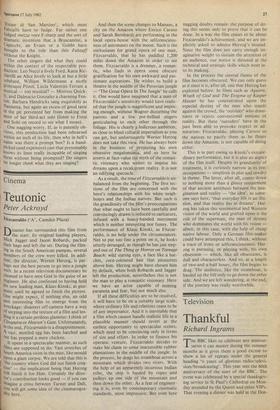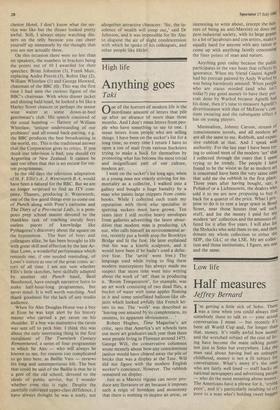Television
Thankful
Richard Ingrams
The BBC likes to celebrate any anniver- saries it can muster during the summer months as it gives them a good excuse to show a lot of repeats under the general heading 'x years of glorious radio/televi- sion/broadcasting'. This year sees the 60th anniversary of the start of the BBC. The event was celebrated by a special thanksgiv- ing service in St Paul's Cathedral on Mon- day attended by the Queen and other VIPs. That evening a dinner was held at the Dor-
chester Hotel. I don't know what the ser- vice was like but the dinner looked pretty awful. Still, I always enjoy watching din- ners on the telly because you can cheer yourself up immensely by the thought that you are not actually there.
On this occasion there were no less than six speakers, the numbers in brackets being the points out of 10 I awarded for their speeches: Brian Johnston (3), Frank Muir, replacing Andre Previn (3), Robin Day (2), William Whitelaw (1) and George Howard, chairman of the BBC (0). This was the first time I had seen the curious figure of the BBC's chairman. With white dinner jacket and shining bald head, he looked a bit like a Harley Street chancer or perhaps the senior wine waiter at some down-at-heel gentleman's club. His speech consisted of the usual humbug — flattery of William Whitelaw, 'unique understanding of our problems' and all-round back-patting, e.g. the BBC produces the best broadcasting in the world, etc. This is the traditional answer that the Corporation gives its critics. If you think our television is bad, you should try Argentina or New Zealand. It cannot be said too often that this is no excuse for rot- ten programmes.
In the old days the television adaptation of H. F. Ellis's A. J. Wentworth B.A. would have been a natural for the BBC. But we are no longer surprised to find an ITV com- pany, Thames, producing it. Wentworth, one of the few good things ever to come out of Punch along with Pont's cartoons and The Diary of a Provincial Lady, is a pom- pous prep school master devoted to the thankless task of teaching unruly boys useless pieces of knowledge like Pythagoras's discovery about the square on the hypotenuse. The butt of boys and colleagues alike, he has been brought to life with great skill and affection by the late Ar- thur Lowe, a wonderful performance which reminds one, if one needed reminding, of Lowe's stature as one of the great comic ac- tors of all time. I am not sure whether Ellis's little sketches, here skilfully adapted by another old Punch hand, Basil Boothroyd, have enough narrative force to make half-hour-long programmes, but never mind. It is well worth watching. And thank goodness for the lack of any studio audience.
When Sir Alec Douglas-Home was a boy at Eton he was kept alert by his history master who carried a pet raven on his shoulder. If a boy was inattentive the raven was sent off to peck him. I think this was about the only interesting thing in the first instalment of The Twentieth Century Remembered, a series of four programmes in which Sir Alec — who will always be known to me, for reasons too complicated to go into here, as Baillie Vass — reviews his long and untempestuous life. The best that could be said of the Baillie is that he is a gent of the old school, devoted to the ideals of public service, but I wonder whether even this is right. Despite the carefully cultivated upper-class diffidence, I have always thought he was a steely, not
altogether attractive character. 'Sir, the in- solence of wealth will creep out,' said Dr Johnson, and it was impossible for Sir Alec to disguise the air of slight condescension with which he spoke of his colleagues, and other people like Hitler.



































 Previous page
Previous page